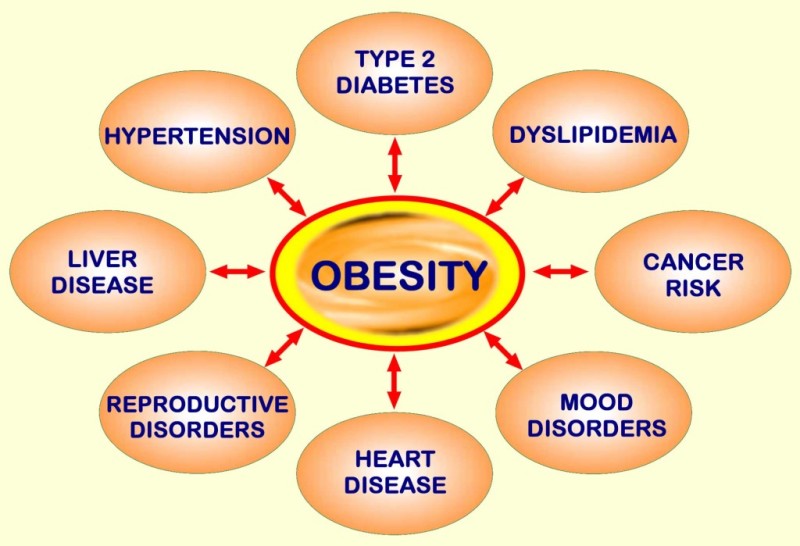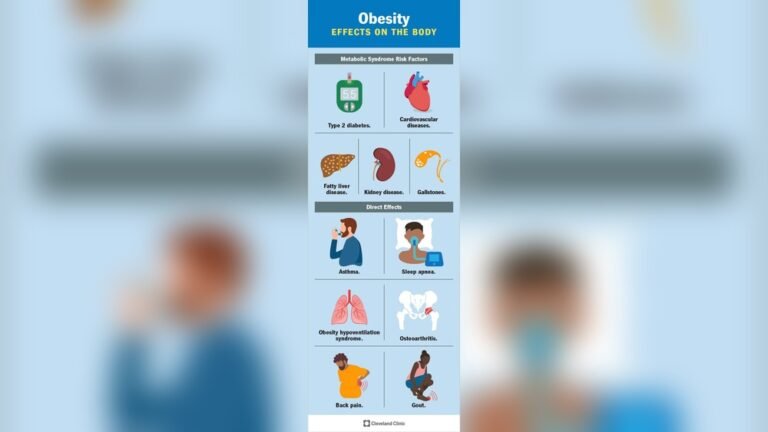You might think extra weight is just a number on the scale, but it can affect much more than how you look. Obesity can lead to serious health problems that impact your daily life and future well-being.
From heart disease and stroke to joint pain and sleep issues, carrying excess weight puts a heavy burden on your body. If you want to protect your health and understand the risks you face, it’s important to know exactly what obesity can lead to.
Keep reading to discover how obesity affects your heart, organs, joints, and even your mental health—and learn what steps you can take to reduce these risks starting today.

Credit: www.healthline.com
Health Risks To The Heart
Obesity significantly impacts heart health. Excess body weight forces the heart to work harder. This added strain raises the chances of serious heart problems. Understanding these risks helps in taking early steps toward better heart care.
Heart Disease And Obesity
Obesity increases the risk of heart disease sharply. Extra fat causes high blood pressure and cholesterol levels. These conditions damage arteries, leading to coronary artery disease. The heart struggles to pump blood efficiently. Over time, this strain can cause heart failure. Obesity also raises the chance of irregular heartbeats. Each of these issues makes heart disease more likely.
Stroke Risk Increase
Obesity raises the risk of stroke significantly. High blood pressure and clogged arteries cause strokes. Excess weight worsens these factors. Blood flow to the brain can become blocked or reduced. This leads to brain damage or death. Stroke risk rises as body mass index (BMI) increases. Managing weight helps lower the chances of having a stroke.

Credit: www.niddk.nih.gov
Liver And Kidney Issues
Obesity puts extra strain on the liver and kidneys. These organs must work harder to manage the body’s increased demands. This stress can lead to serious health problems over time. Understanding these risks helps highlight the importance of maintaining a healthy weight.
Fatty Liver Disease
Obesity is a main cause of fatty liver disease. This condition happens when too much fat builds up in liver cells. It can cause liver inflammation and damage. Fatty liver disease can progress to cirrhosis, which is severe liver scarring. This scarring reduces the liver’s ability to function properly. Many people with obesity do not notice symptoms at first. Early detection and weight loss can help reverse the disease.
Chronic Kidney Disease
Excess body weight increases the risk of chronic kidney disease (CKD). Obesity causes changes in kidney structure and function. The kidneys filter waste and excess fluids from the blood. When they are overworked, they can become damaged. CKD can lead to kidney failure, requiring dialysis or transplant. Controlling weight and blood pressure reduces this risk. Healthy lifestyle choices protect kidney health over time.
Cancer Risks Linked To Obesity
Obesity increases the risk of developing various cancers. Excess body fat causes changes in the body that promote cancer growth. Fat tissue produces hormones and inflammatory substances that can damage cells. These changes affect different organs, raising cancer risks significantly. Understanding these risks helps in taking preventive steps and improving overall health.
Gastrointestinal Cancers
Obesity raises the chance of cancers in the digestive tract. Colon cancer is one of the most common types linked to obesity. Fat tissue causes inflammation in the intestines, which can lead to cell damage. This damage increases the risk of cancerous growths. Obesity also raises the risk of esophageal cancer, stomach cancer, and pancreatic cancer. Excess fat affects how the body processes insulin and other hormones. These changes can encourage cancer cells to grow faster.
Endometrial Cancer
Endometrial cancer affects the lining of the uterus. Obesity is one of the strongest risk factors for this cancer. Fat cells produce extra estrogen, a hormone that can cause the uterine lining to grow too much. This excess growth can turn into cancer over time. Women with obesity have a much higher chance of developing this type of cancer. Maintaining a healthy weight helps lower the risk and supports hormone balance.
Musculoskeletal And Breathing Problems
Obesity affects the body in many ways. It puts extra strain on muscles and bones. This strain causes pain and limits movement. Breathing also becomes harder due to added weight on the chest. These problems reduce quality of life and increase health risks.
Joint And Back Pain
Extra body weight stresses joints, especially knees and hips. This stress leads to inflammation and pain. Many people with obesity develop osteoarthritis. The spine also suffers, causing chronic back pain. Movement becomes difficult and painful. Over time, this can limit daily activities and reduce independence.
Sleep Apnea Effects
Obesity increases the risk of sleep apnea. This condition blocks airways during sleep. Breathing stops briefly, causing poor sleep quality. Daytime tiredness and lack of focus are common. Sleep apnea raises blood pressure and heart risks. Treatment often requires lifestyle changes and medical care.
Reproductive And Skin Health
Obesity affects many body functions, including reproductive and skin health. Excess weight changes hormone levels and body processes. These changes can cause serious health problems. Understanding these effects helps in managing risks and improving quality of life.
Infertility And Pregnancy Complications
Obesity can reduce fertility in both men and women. It disrupts hormone balance, which affects ovulation and sperm quality. Women with obesity face higher chances of irregular menstrual cycles. This makes it harder to conceive naturally.
During pregnancy, obesity increases risks for both mother and baby. Problems like gestational diabetes and high blood pressure become more common. These complications may lead to premature birth or the need for a cesarean section. Proper care and weight management can lower these risks.
Skin Rashes And Infections
Excess body weight causes more skin folds and friction. This creates a warm and moist environment perfect for rashes and infections. Common issues include fungal infections and intertrigo, which cause redness and itching.
Obesity also slows the skin’s healing process. Cuts or wounds may take longer to heal, raising infection risk. Maintaining hygiene and managing weight help protect the skin from these problems.
Other Health Concerns
Obesity affects the body in many ways beyond common physical illnesses. It can cause other serious health concerns that impact daily life and overall well-being. These issues often remain unnoticed but can be just as harmful.
Erectile Dysfunction
Obesity increases the risk of erectile dysfunction in men. Excess fat affects blood flow and hormone levels. This can make it difficult to achieve or maintain an erection. The condition may cause stress and affect relationships.
Losing weight and improving lifestyle habits can reduce the risk. Seeking medical advice is important for proper treatment and support.
Mental Health Challenges
Obesity often links to mental health problems such as depression and anxiety. Low self-esteem and social stigma can lower mood and energy. This can create a cycle that makes weight loss harder.
Addressing mental health is crucial in managing obesity. Support from professionals can improve emotional well-being and motivation. Healthy habits help both body and mind feel better over time.

Credit: www.ncbi.nlm.nih.gov
Conclusion
Obesity affects many parts of the body and overall health. It raises the risk of heart disease, stroke, and diabetes. Joint pain and sleep apnea often occur with extra weight. Liver and kidney problems can develop over time. Obesity may also cause skin issues and affect mental well-being.
Taking small steps to manage weight helps reduce these risks. Staying active and eating healthy can improve life quality. Everyone deserves a healthier future free from obesity-related problems.



